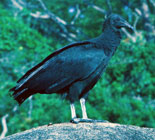 |
 |
 |
Press
"Maungatautari Ratesplace on Global Map"
By JEFF NEEMS - Waikato Times | Tuesday, 04 December 2007
Waikato's ecological oasis, Maungatautari, features as one of the planet's 35 most biologically significant sites in a new international documentary to screen in Hamilton next week.
The New Zealand premier of Hotspots will be held at Waikato University's Gallagher Chamber (Wel Energy Trust Academy of Performing Arts) next Thursday, and will include a short talk by director Michael Tobias. He and co-director Jane Gray Morrison spent several weeks on Maungatautari last year filming for their documentary.
The 90-minute film, released earlier this year, covers efforts to save tens of thousands of species globally and 35 different locations considered Earth's most biologically important sites. The film took three years to make and covers some 20 years of research.
"From the trust perspective, we're delighted to have been chosen to show the premier," said Jim Mylchreest, Maungatautari Ecological Island Trust chief executive. "It's recognition of the importance of Maungatautari in terms of conservation issues in New Zealand and overseas."
Mr Mylchreest said trust chairman David Wallace was also involved in production of the film, which shows his farm Warrenenheip, near Karapiro where pest fencing technology for the mountain was developed.
Meanwhile, the Lion Foundation has donated a further $500,000 to the trust so it can build a new visitor centre and public toilets, and to assist with reintroduction of several species and pest eradication.
Mr Mylchreest said the foundation had been a great supporter of Maungatautari, having also funded the pest-proof fence around the mountain's southern enclosure.
"We hope to start construction of the visitor centre before Christmas, and plan to have it completed before April," said Mr Mylchreest.
Livestock genetics firm Ambreed has donated $10,000, which the trust will use for science and research at Ambreed's request.
Mr Mylchreest said a portion of Ambreed's grant would go to research on pest behaviour and the interaction of animals such and mice and rats with Maungatautari's 42km pest-proof fence.
Operations manager Pim de Monchy said two male kiwi Elmo and Robin have been nesting for several weeks on the mountain.
"Both males are fitted with egg-timer transmitters, which tell us the males have been incubating eggs since the last week in September," said Mr de Monchy. "We're expecting a hatch in the middle of December."
Staff had not been able to see right inside the kiwis' nests, despite using cameras attached to 1m-long sticks. Staff will camp out again early next week to investigate nests.
Tickets for the documentary screening can be purchased by phoning 0800 383 4200, or by visiting www.ticketdirect.co.nz. Doors open at 7pm, and Mr Tobias will introduce the film at 8pm.
 BACK TO TOP
BACK TO TOP
 |
|
 |
|
"Maungatautari Ratesplace on Global Map"
By JEFF NEEMS - Waikato Times | Tuesday, 04 December 2007
Waikato's ecological oasis, Maungatautari, features as one of the planet's 35 most biologically significant sites in a new international documentary to screen in Hamilton next week.
The New Zealand premier of Hotspots will be held at Waikato University's Gallagher Chamber (Wel Energy Trust Academy of Performing Arts) next Thursday, and will include a short talk by director Michael Tobias. He and co-director Jane Gray Morrison spent several weeks on Maungatautari last year filming for their documentary.
The 90-minute film, released earlier this year, covers efforts to save tens of thousands of species globally and 35 different locations considered Earth's most biologically important sites. The film took three years to make and covers some 20 years of research.
"From the trust perspective, we're delighted to have been chosen to show the premier," said Jim Mylchreest, Maungatautari Ecological Island Trust chief executive. "It's recognition of the importance of Maungatautari in terms of conservation issues in New Zealand and overseas."
Mr Mylchreest said trust chairman David Wallace was also involved in production of the film, which shows his farm Warrenenheip, near Karapiro where pest fencing technology for the mountain was developed.
Meanwhile, the Lion Foundation has donated a further $500,000 to the trust so it can build a new visitor centre and public toilets, and to assist with reintroduction of several species and pest eradication.
Mr Mylchreest said the foundation had been a great supporter of Maungatautari, having also funded the pest-proof fence around the mountain's southern enclosure.
"We hope to start construction of the visitor centre before Christmas, and plan to have it completed before April," said Mr Mylchreest.
Livestock genetics firm Ambreed has donated $10,000, which the trust will use for science and research at Ambreed's request.
Mr Mylchreest said a portion of Ambreed's grant would go to research on pest behaviour and the interaction of animals such and mice and rats with Maungatautari's 42km pest-proof fence.
Operations manager Pim de Monchy said two male kiwi Elmo and Robin have been nesting for several weeks on the mountain.
"Both males are fitted with egg-timer transmitters, which tell us the males have been incubating eggs since the last week in September," said Mr de Monchy. "We're expecting a hatch in the middle of December."
Staff had not been able to see right inside the kiwis' nests, despite using cameras attached to 1m-long sticks. Staff will camp out again early next week to investigate nests.
Tickets for the documentary screening can be purchased by phoning 0800 383 4200, or by visiting www.ticketdirect.co.nz. Doors open at 7pm, and Mr Tobias will introduce the film at 8pm.

